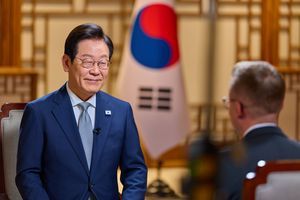![Japan]](https://contents-cdn.viewus.co.kr/image/2025/07/CP-2023-0309/30841156.jpg) TOKYO (AP) — Japanese Prime Minister Shigeru Ishiba’s ruling coalition failed Monday to secure a majority in the 248-seat upper house in a crucial parliamentary election, NHK public television reported.
TOKYO (AP) — Japanese Prime Minister Shigeru Ishiba’s ruling coalition failed Monday to secure a majority in the 248-seat upper house in a crucial parliamentary election, NHK public television reported.
This defeat marks another significant blow to Ishiba’s coalition, leaving it in the minority in both houses following its October loss in the lower house election. The outcome exacerbates Japan’s political instability. It’s the first time since the LDP’s founding in 1955 that the party has lost its majority in both houses of parliament.
Despite the setback, Ishiba expressed his determination to remain in office and avoid creating a political vacuum while addressing pressing challenges, including U.S. tariff threats. However, he may face internal party pressure to step down or seek a new coalition partner.
\”I will fulfill my responsibility as head of the leading party and work for the country,\” Ishiba stated.
Ishiba had set a modest goal of securing a simple majority of 125 seats, which required his LDP and its Buddhist-backed junior partner Komeito to win 50 seats. Exit polls released immediately after voting ended Sunday night largely indicated a major setback for Ishiba’s coalition.
The LDP alone secured 39 seats, surpassing most exit poll projections of 32, and remains the dominant party in the Diet. However, Ishiba acknowledged that the coalition’s poor performance stemmed from his government’s ineffective measures to combat rising prices, which have yet to reach many citizens.
\”We’re in a difficult position. I accept these results humbly and sincerely,\” Ishiba told NHK in a live interview.
While the election’s disappointing outcome won’t immediately trigger a change in government, as the upper house lacks the power to issue a no-confidence motion against a leader, it will undoubtedly deepen uncertainty about Ishiba’s future and Japan’s political stability. He may face mounting pressure from within the LDP to resign or find a new coalition partner.
Frustrated, cash-strapped voters are primarily concerned about soaring prices, stagnant incomes, and burdensome social security payments. Additionally, stricter measures targeting foreign residents and visitors have emerged as a key issue, with a surging right-wing populist party leading the campaign on this front.
Sunday’s vote follows Ishiba’s coalition losing its majority in the October lower house election, which was marred by past corruption scandals. Since then, his unpopular government has been forced to make concessions to the opposition to pass legislation. It has struggled to swiftly implement effective measures to address rising prices, including for Japan’s staple food, rice, and to combat declining wages.
U.S. President Donald Trump has intensified pressure on Japan, expressing frustration over the lack of progress in trade negotiations and the absence of sales of U.S. automobiles and American-grown rice to Japan, despite a domestic shortfall in rice stocks. A 25 percent tariff set to take effect on August 1 has added further strain on Ishiba’s administration.
Ishiba resisted compromise before the election, but the prospect of a breakthrough afterward remains uncertain, as the minority government would face significant challenges in forming a consensus with the opposition.
Disillusioned voters are increasingly turning to emerging populist parties. However, the eight main opposition groups remain too fragmented to present a united front and offer a viable alternative to the electorate.
The rising populist party Sanseito stands out with its hardline anti-foreigner stance, promoting a \”Japanese First\” platform that proposes creating a new agency to manage policies related to foreigners. The party’s populist agenda also includes anti-vaccine sentiments, anti-globalism, and support for traditional gender roles.
Conservative opposition groups, particularly the DPP and Sanseito, made significant gains at the expense of the Liberal Democrats, while the centrist top opposition party, CDPJ, struggled. According to interim results reported by Japanese media, the DPP quadrupled its seats from 4 to 17. Sanseito surged from just 1 seat to 14.
DPP leader Yuichiro Tamaki attributed his party’s substantial gains to voters seeking a new alternative. None of the opposition parties expressed willingness to cooperate with the governing coalition. CDPJ leader Yoshihiko Noda told NHK that his priority is to forge an alliance among opposition parties. \”The public has clearly rejected the Ishiba government,\” Noda stated.
The proliferation of xenophobic rhetoric during the election campaign and on social media has sparked protests from human rights activists and alarmed foreign residents.
The LDP has maintained almost continuous dominance in Japan’s postwar politics, contributing to political stability and social conformity. However, voters now find themselves torn between stability and change, with some expressing concern about escalating xenophobia.
Yuko Tsuji, a 43-year-old consultant who visited a polling station in a downtown Tokyo gymnasium with her husband, said they both support the LDP for its emphasis on stability and unity. They voted \”for candidates who won’t fuel division. If the ruling party doesn’t govern properly, the conservative base will drift toward extremes. So I voted hoping the ruling party would tighten things up,\” she explained.
Self-employed Daiichi Nasu, 57, who came to vote with his dog, expressed his desire for a shift toward a more inclusive and diverse society. He advocated for more open immigration and gender policies, such as allowing married couples to retain separate surnames.
\”That’s why I voted for the CDPJ,\” he said. \”I want to see progress on those fronts.\”









Most Commented